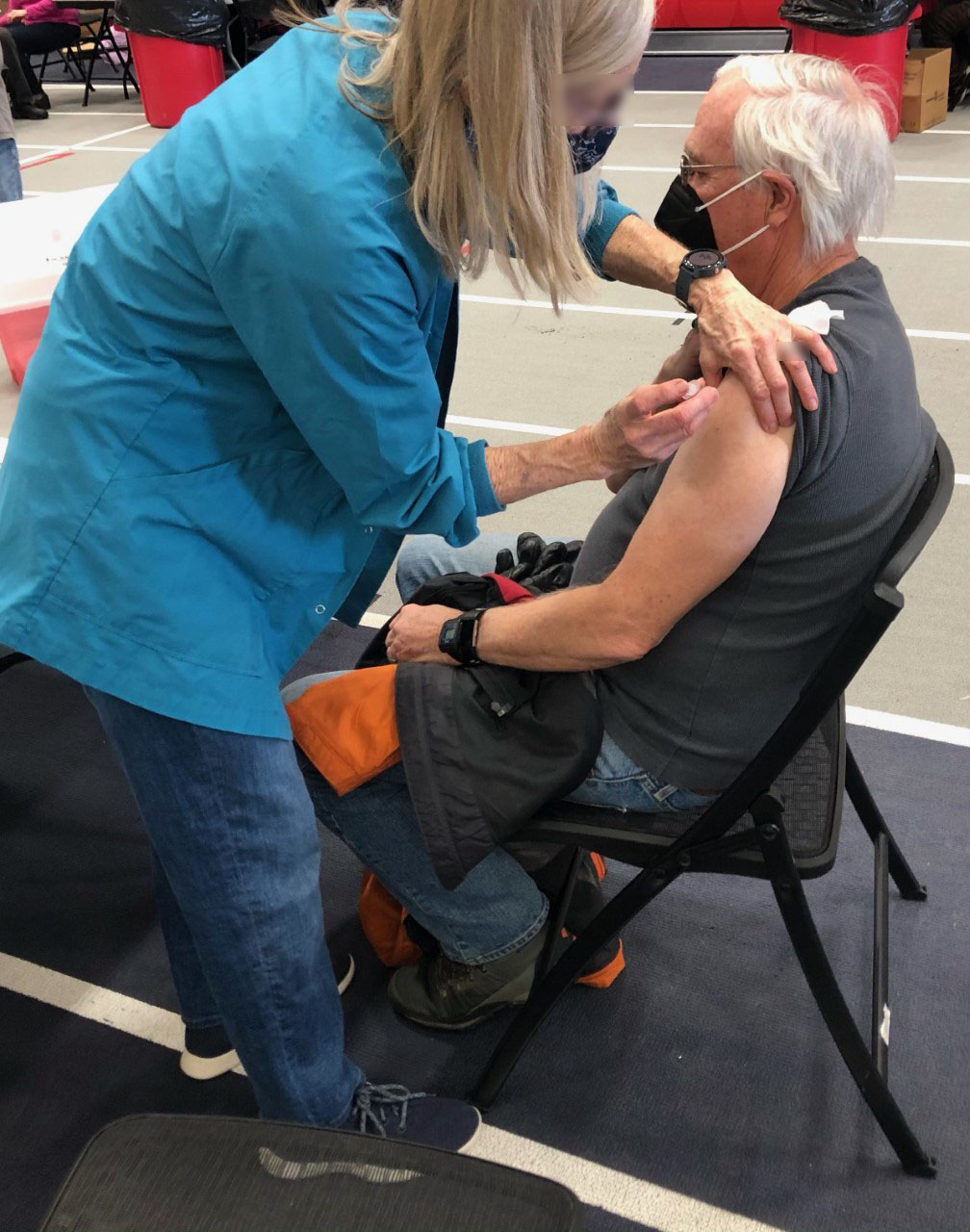
 (NewMediaWire) – September 24, 2021 – DALLAS – Today, the U.S. Centers for Disease Control and Prevention (CDC) recommended a third dose of the Pfizer-BioNTech COVID-19 vaccine, at least 6 months after receiving the initial two doses of the Pfizer-BioNTech COVID-19 vaccine, for adults ages 65 and older including those who live in long-term care facilities and adults ages 50-64 with other health conditions that increase their risk of severe COVID-19 infection. Adults ages 18-49 who have preexisting health conditions (and based on the individual benefits and risks); and adults ages 18-64 who are at increased risk of exposure to COVID-19 at work as a first-responder, health care professional, teacher or other frontline worker may receive a third dose of the Pfizer-BioNTech COVID-19 vaccine, at least 6 months after receiving the initial two doses of the Pfizer-BioNTech COVID-19 vaccine.[1] These recommendations follow Wednesday’s announcement from the U.S. Food and Drug Administration (FDA) amending the emergency use authorization of the Pfizer-BioNTech COVID-19 vaccine to allow for a third dose of the Pfizer-BioNTech COVID-19 vaccine for select adults.[2] The new guidance applies only to the Pfizer-BioNTech COVID-19 vaccine, and to the select groups of adults listed, at least 6 months after they received the initial two doses of the Pfizer-BioNTech COVID-19 vaccine.
(NewMediaWire) – September 24, 2021 – DALLAS – Today, the U.S. Centers for Disease Control and Prevention (CDC) recommended a third dose of the Pfizer-BioNTech COVID-19 vaccine, at least 6 months after receiving the initial two doses of the Pfizer-BioNTech COVID-19 vaccine, for adults ages 65 and older including those who live in long-term care facilities and adults ages 50-64 with other health conditions that increase their risk of severe COVID-19 infection. Adults ages 18-49 who have preexisting health conditions (and based on the individual benefits and risks); and adults ages 18-64 who are at increased risk of exposure to COVID-19 at work as a first-responder, health care professional, teacher or other frontline worker may receive a third dose of the Pfizer-BioNTech COVID-19 vaccine, at least 6 months after receiving the initial two doses of the Pfizer-BioNTech COVID-19 vaccine.[1] These recommendations follow Wednesday’s announcement from the U.S. Food and Drug Administration (FDA) amending the emergency use authorization of the Pfizer-BioNTech COVID-19 vaccine to allow for a third dose of the Pfizer-BioNTech COVID-19 vaccine for select adults.[2] The new guidance applies only to the Pfizer-BioNTech COVID-19 vaccine, and to the select groups of adults listed, at least 6 months after they received the initial two doses of the Pfizer-BioNTech COVID-19 vaccine.
Last month, the CDC recommended a third dose of the Pfizer-BioNTech or Moderna COVID-19 vaccine to anyone with a moderately to severely compromised immune system, including those who have had a heart, stem cell or other organ transplant and are on immunosuppressive treatment, or who have weakened immune systems due to disease or other medical treatment including active cancer therapy.[3] This guidance remains the same and is aligned with the FDA’s August 12 amendment to the emergency use authorization for the mRNA COVID-19 vaccines manufactured by Pfizer-BioNTech or Moderna to allow certain immunocompromised individuals to receive a third dose of the same mRNA COVID-19 vaccine in addition to the initial two doses.[4]
At this time, the CDC guidance and the FDA authorization for an additional COVID-19 vaccine dose, or booster shot, does not include any other age groups or populations who received the Moderna COVID-19 vaccine or anyone who received the Johnson & Johnson COVID-19 vaccine. The FDA and the CDC are expecting to review data regarding boosters for the Moderna and Johnson & Johnson COVID-19 vaccines in the coming weeks.[5]
The American Heart Association/American Stroke Association, a global force for longer, healthier lives for all, supports the new recommendation from the CDC for adults 65 and older; people who have cardiovascular disease including heart disease, high blood pressure, history of a heart attack, stroke, heart failure, arrhythmia or heart valve conditions; those who have increased risk of exposure to COVID-19 as a health care professional, first responder or other frontline worker to receive a third Pfizer-BioNTech COVID-19 vaccine dose.
The Association remains concerned about the continuing gaps in COVID-19 vaccination among people from all eligible age groups in the U.S. including people from diverse racial and ethnic groups. Therefore, we continue to urge all adults and children ages 12 and older in the U.S. to receive a COVID-19 vaccine as soon as they can, as recommended by the CDC and fully approved or authorized for emergency use by the FDA.
The following statement reflects the views of the American Heart Association/American Stroke Association and its science leaders:
- President Donald Lloyd-Jones, M.D., Sc.M., FAHA,
- Immediate Past President Mitchell S.V. Elkind, M.D., M.S., FAHA, FAAN,
- President-Elect Michelle A. Albert, M.D., M.P.H., FAHA,
- Chief Science and Medical Officer Mariell Jessup, M.D., FAHA, and
- Chief Medical Officer for Prevention Eduardo Sanchez, M.D, M.P.H., FAHA, FAAFP.
“As recommended and allowed by the CDC and authorized by the FDA, we urge the following adults to receive a third dose of the Pfizer-BioNTech COVID-19 vaccine at least 6 months after they received the initial 2 doses of the Pfizer-BioNTech COVID-19 vaccine:
- adults ages 65 and older including residents of long-term care facilities;
- adults ages 50-64 who are at increased risk of severe COVID-19 infection due to preexisting medical conditions;
- adults 18-49 with preexisting medical conditions, based on individual benefits and risks; and
- adults ages 18-64 who have an increased risk of exposure to the COVID-19 virus due to their role as a health care professional, first responder or other frontline worker including teachers and child care workers.
“Today’s CDC guidance applies only to select adults who previously received the Pfizer-BioNTech COVID-19 vaccine. We look forward to guidance in the coming weeks from the CDC and the FDA about additional doses of the Moderna and Johnson & Johnson COVID-19 vaccines.
“Research indicates a third COVID-19 vaccine dose provides more protection against COVID-19 infection and reduces the risk of serious, prolonged illness if an individual contracts the COVID-19 virus. Please consult with a health care professional if you have any questions about whether a third COVID-19 vaccine dose is appropriate for you or a loved one.
“We continue to recommend that all adults and children ages 12 and older in the U.S. receive the COVID-19 vaccine as soon as they can. The data continue to confirm that the COVID-19 vaccines are highly effective at preventing serious COVID-19 infection, hospitalization and death, particularly given how highly contagious the Delta variant is compared to the initial COVID-19 variants.
“Recently published studies examined by the CDC continue to find the COVID-19 vaccines are highly effective against COVID-19 infection and hospitalization. COVID-19 hospitalization is 29 times more likely among people who are not vaccinated.[6] Many hospitals around the country are at capacity, and some are facing dire situations. COVID-19 vaccination can help prevent the health care system from being overwhelmed and save lives.
“The Association continues to support the CDC’s updated safety recommendations due to the Delta variant of the COVID-19 virus: mask wearing for all people regardless of vaccination status when indoors, frequent handwashing and social distancing. These protocols along with COVID-19 vaccination are essential to minimizing the spread of the COVID-19 virus.
“Full COVID-19 vaccination, as outlined by the CDC, for as many people as possible is fundamental to protecting public health, saving lives and ending the COVID-19 pandemic.”
Additional Resources:
The Association receives funding primarily from individuals. Foundations and corporations (including pharmaceutical, device manufacturers and other companies) also make donations and fund specific Association programs and events. The Association has strict policies to prevent these relationships from influencing the science content. Revenues from pharmaceutical and biotech companies, device manufacturers and health insurance providers and the Association’s overall financial information are available here.
About the American Heart Association/American Stroke Association
The American Heart Association is a relentless force for a world of longer, healthier lives and includes the American Stroke Association. We are dedicated to ensuring equitable health in all communities. Through collaboration with numerous organizations, and powered by millions of volunteers, we fund innovative research, advocate for the public’s health and share lifesaving resources. The Dallas-based organization has been a leading source of health information for nearly a century. Connect with us on heart.org, Facebook, Twitter or by calling 1-800-AHA-USA1.
###
For Media Inquiries: 214-706-1173, AHACommunications@heart.org
Michelle Kirkwood: 703-457-7838, michelle.kirkwood@heart.org
Public Inquiries: 1-800-AHA-USA1 (242-8721)
heart.org and stroke.org
